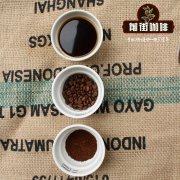Introduction to the flavor of water-washed coffee beans in Kenya

Professional coffee knowledge exchange more coffee bean information please follow the coffee workshop (Wechat official account cafe_style)
A brief introduction to the flavor of Kenya Timani maiden washing coffee producing area in Qianjie
Washed coffee only focuses on the flavor of the bean itself, which is designed to allow you to taste the flavor inside the bean rather than the flavor added to the bean surface.
Sun-or honey-treated coffee requires coffee cherries to have flavor. However, the flavor of washed coffee is almost 100% dependent on the natural sugars and nutrients absorbed by coffee beans during their growth cycle. This means that variety, soil, weather, maturity, fermentation, washing method and drying process are all absolutely critical.
Washed coffee reflects not only the perfect planting science, but also the fact that coffee farmers are an indispensable part of creating coffee bean flavor. When we deal with washed coffee, it is clear that origin and environmental conditions play a vital role in increasing flavor.
This means that the washing process can highlight the true characteristics of single-origin coffee beans like other processes-which is why so much boutique coffee is washed.
"washed Ethiopia and Kenya have extremely clear flavors, and if handled correctly, their high-quality flavors will be perfectly presented."
[Timani maiden of Kenya]
The Timani maiden of Kenya is from Karadina, a micro-area in NYERI (Neri), and the Ndima-ini (Ntani processing plant) factory is part of the Gakuyu cooperative, which broke away from the large Mathera cooperative in 1996 and became its own. The Gakuyu cooperative has only two factories, Ndima-ini and Kirigu, and employs 1800 people. The name of the Kirigu factory is taken from the name of the Kirigu River, which supplies water and treats coffee fruits near the factory.
Over the past 20 years, about 850 small farmers have brought ripe coffee fruits to the Ndima-ini factory and handed them over to plant manager John Kamau. This Timani girl in Kenya is different from the previous 72-hour fermentation water washing treatment in Kenya, where coffee beans are peeled, soaked and fermented for 80 hours, and finally dried naturally on a high bed.
Flavor: black plum, berry, virgin fruit, plum, cream.
END
Important Notice :
前街咖啡 FrontStreet Coffee has moved to new addredd:
FrontStreet Coffee Address: 315,Donghua East Road,GuangZhou
Tel:020 38364473
- Prev

The process of washing coffee beans Panamanian flower butterfly wash coffee or sun which is better
Professional coffee knowledge exchange more coffee bean information Please pay attention to the coffee workshop (Wechat official account cafe_style) the front street Panamanian Flower Butterfly Coffee washing and sun flavor comparison water washing treatment is one of the more popular among the three treatments, most boutique coffee beans choose water washing. Washing process: selecting beans, removing pulp, fermenting, washing, drying, shelling, selecting and grading export.
- Next

Introduction to the method of washing Yejafei Fruit Ding Coffee
Professional coffee knowledge exchange more coffee bean information please follow the coffee workshop (Wechat official account cafe_style) the front street wash Yega Sheffield Tintin Coffee Flavor introduction Guotintin Cooperative, located in the Waka producing area at the southeast end of Yega Sheffield, it was originally part of the Waka Cooperative of YCFCU of the Yega Sheffield Alliance. But later, with the traceability of raw coffee beans,
Related
- Beginners will see the "Coffee pull flower" guide!
- What is the difference between ice blog purified milk and ordinary milk coffee?
- Why is the Philippines the largest producer of crops in Liberia?
- For coffee extraction, should the fine powder be retained?
- How does extracted espresso fill pressed powder? How much strength does it take to press the powder?
- How to make jasmine cold extract coffee? Is the jasmine + latte good?
- Will this little toy really make the coffee taste better? How does Lily Drip affect coffee extraction?
- Will the action of slapping the filter cup also affect coffee extraction?
- What's the difference between powder-to-water ratio and powder-to-liquid ratio?
- What is the Ethiopian local species? What does it have to do with Heirloom native species?

